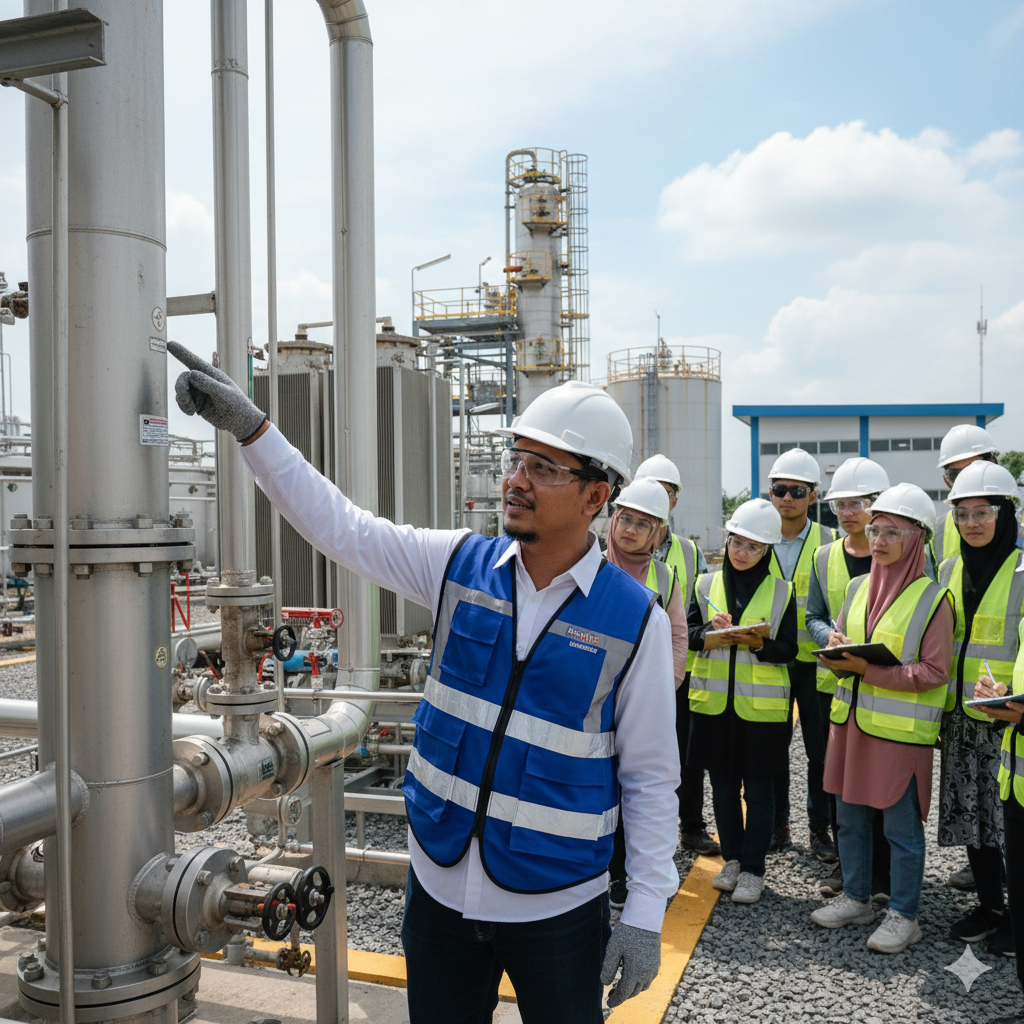
Sambutan Hangat dan Perkenalan Kurikulum Teknik Kimia UNIMAL 2025–2029!
Halo calon insinyur dan rekan-rekan industri!
Kami sangat antusias untuk memperkenalkan "jantung" pendidikan di Program Studi Teknik Kimia (PSTK) Fakultas Teknik Universitas Malikussaleh (UNIMAL): Kurikulum Merdeka 2025–2029!
Kurikulum ini bukan sekadar daftar mata kuliah. Ini adalah peta jalan yang kami rancang ulang secara total untuk memastikan Anda, para lulusan kami, benar-benar siap menghadapi dunia nyata yang bergerak super cepat, terutama di era Revolusi Industri 4.0.
Setelah mengevaluasi secara mendalam kurikulum sebelumnya, kami menyusun Kurikulum 2025 ini agar sejalan dengan semangat pemerintah, yaitu Merdeka Belajar Kampus Merdeka (MBKM). Kurikulum ini mulai berlaku pada Semester Ganjil Tahun Akademik 2025/2026.
Filosofi Baru: Lulusan Siap Tempur (OBE dan MBKM)
Kurikulum 2025 ini dibangun di atas dua pilar utama:
- Pendidikan Berbasis Luaran (Outcome-Based Education / OBE): Kami tidak hanya fokus pada proses, tetapi pada hasil. Seluruh pembelajaran dirancang agar ketika Anda lulus, Anda sudah mengantongi pengetahuan, skill, dan etika yang dicari oleh industri, baik nasional maupun internasional.
- Merdeka Belajar Kampus Merdeka (MBKM): Inilah kesempatan emas Anda! Kami memfasilitasi Anda untuk belajar hingga tiga semester di luar program studi. Anda bisa mengambil kesempatan untuk:
- Magang Jangka Panjang di industri-industri kimia terkemuka.
-
Terlibat dalam Riset/Penelitian di lembaga-lembaga riset.
-
Memulai Bisnis Sendiri melalui jalur kewirausahaan.
Menjadi Insinyur Kimia yang Lokal dan Global
Kami telah menetapkan tiga peran utama yang akan Anda jalankan setelah lulus:
-
Insinyur Proses Kimia (Chemical Engineer): Menjadi perancang, pengelola, dan troubleshooter andal di pabrik (seperti Production Engineer, Process Design Engineer, atau Safety Engineer).
-
Wirausahawan (Entrepreneur): Menjadi Technopreneur yang mampu menciptakan lapangan kerja, khususnya dengan memanfaatkan potensi lokal.
-
Akademisi dan Peneliti: Siap melanjutkan studi lebih tinggi atau berkarier di bidang akademik dan penelitian.
Untuk mencapai itu, Anda wajib menyelesaikan minimal 145 SKS yang dibagi dalam 8 semester.
Pesan Penting: Kurikulum kami memiliki fokus kuat pada Potensi Lokal. Ini berarti kami berkomitmen untuk mengembangkan ilmu dan inovasi yang relevan dengan kekayaan alam, budaya, dan sumber daya di sekitar kita, agar produk inovatif kita diakui di tingkat internasional.
Struktur Kurikulum yang Lebih Ramping dan Relevan
Untuk membuat pembelajaran lebih efektif, kami melakukan beberapa penyesuaian:
- Penyelarasan Nama Mata Kuliah: Beberapa mata kuliah inti telah disesuaikan namanya agar lebih modern dan sesuai dengan standar APTEKIM. Misalnya, "Operasi Teknik Kimia I" kini menjadi "Mekanika Fluida dan Padatan Teknik Kimia".
- Capstone Design (Tugas Akhir): Proyek besar Anda, yaitu Pra-Rancangan Pabrik Kimia, kini berbobot 4 SKS dan menjadi puncak dari semua ilmu yang Anda pelajari. Ini adalah kesempatan Anda untuk membuktikan kemampuan rekayasa yang terintegrasi.
Kami percaya Kurikulum 2025 ini akan menghasilkan lulusan yang tidak hanya menguasai teori, tetapi juga cekatan dalam praktik, beretika, dan mampu bersaing tinggi, baik di Indonesia maupun kancah global.
Mari bergabung bersama kami dan jadilah bagian dari generasi insinyur kimia UNIMAL yang unggul!






